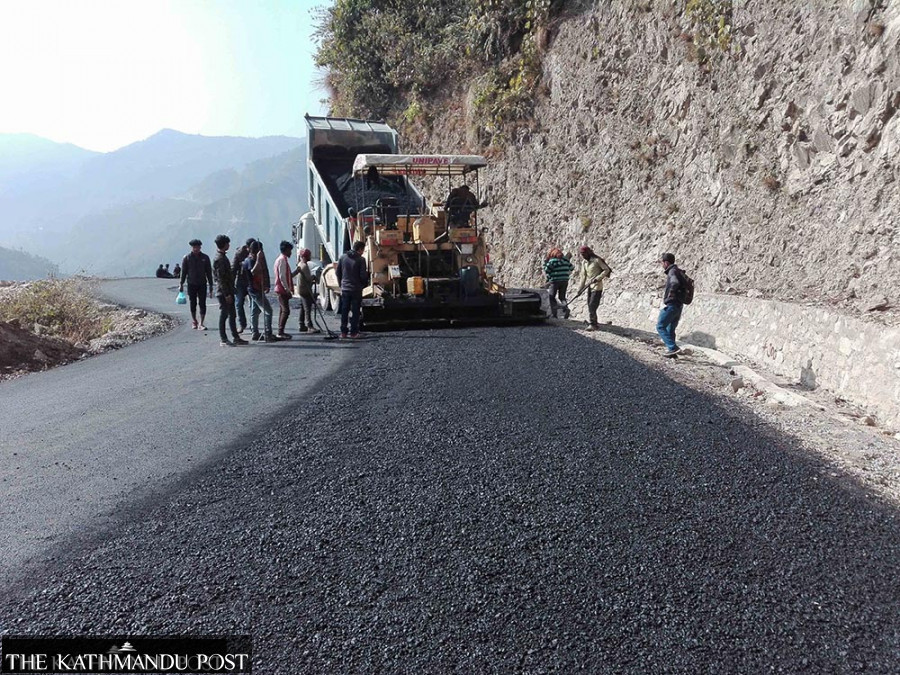Money
Private sector urges massive capex booster to revive economy
Presenting a wishlist for the upcoming budget, industrialists say a larger capital injection would encourage them to pump the money as well.
Post Report
Nepal’s private sector has been counting on the government to target a larger capital expenditure outlay for the upcoming budget to support higher economic growth amid the ongoing economic slowdown.
As per the constitution, the annual budget has to be presented on the 15th day of the Nepali calendar month of Jestha, which falls on May 28 this year.
In a pre-budget discussion, organised by the Society of Economic Journalists-Nepal (SEJON), in Kathmandu, on Thursday, they presented their wish list for the government to be addressed in the upcoming budget for the fiscal year 2024-25.
They said that the government’s capital injection into the economy would encourage the private sector to pump the investment.
Over the years, private investment remained sluggish, as evidenced by decreased imports of capital and intermediate goods. On the other hand, public consumption and investment contracted, driven by austerity measures and low revenue collection.
The annual spending of the three tiers of the government currently stands at a combined Rs500 billion. As the private sector pumped four times more than the government into the national economy, the total expenditure would be Rs2.5 trillion.
Economists and statisticians say there is no environment for Nepal to achieve a double-digit economic growth rate in the immediate future due to the low investment both from the government and the private sector.
The country’s statistical office said recently that given the ongoing investment, Nepal’s growth rate neither will slow down nor grow. It will remain static.
Chandra Prasad Dhakal, president of the Federation of Nepalese Chambers of Commerce and Industry, the apex private sector body, said that the budget should come out in a way that encourages the private sector to invest wholeheartedly.
“As the confidence of the private sector has declined, we suggest that the government bring an ‘investment decade’ programme.”
“If anyone brings investment in the industry that can create employment to 100 individuals, then such businesses should be provided special treatment,” he said.
He said that startups, export-oriented businesses and the tourism industry need to be accorded a special priority.
Dhakal said that the budget should also bring a reinvestment programme allowing any company to reinvest its profit of more than 40 percent.
“The situation of banking and financial institutions is worrisome,” Dhakal said. “The balance sheets of most of the banks are not encouraging according to the report till mid-April. If this situation is overlooked, it may have multiple impacts.”
He said that a certain percentage of the funds from the Social Security Fund, Citizens Investment Trust and Employees Provident Fund needs to be invested in development and infrastructure to generate jobs, Dhakal said.
Kamlesh Agrawal, president of the Nepal Chamber of Commerce, said that the government data show the economy has slowed down, particularly in the retail, wholesale, construction and manufacturing sectors.
Even during the devastating earthquake of April 2015, Nepal’s economic growth was inclining, but the introduction of tight monetary policy has impacted the economic growth since 2021-22.
The budget for the current fiscal year increased the customs rate and even imposed tax on onions and potatoes. “Imposing taxes does not only increase revenue, it increases smuggling,” said Agrawal.
Rajesh Agrawal, president of the Confederation of Nepalese Industries, said as the government did not make payments for the construction sector, it has increased the number of defaulters who are being blacklisted one after another.
He said that there is a false claim in the market that the private sector invested the loans in land and shares, which is completely not true. “Most of the private sector investment has gone to the hydropower and hospitality industry.”
He said that the 13 percent VAT imposed in Nepal and the 5 percent Goods and Services Tax (GST) in India have created a price difference in goods, which has promoted smuggling. “This issue needs to be addressed as proper tax policy will increase the government revenue.”
Sunil KC, president of the Nepal Bankers Association, said that the banking sector is historically in a difficult situation. “Currently, commercial banks can lend Rs500 billion, but the private sector is unable to borrow. This shows low confidence in the private sector to invest.”
He said that the banking and financial sectors have more than 50 million accounts, but only 1.8 million are taking credit.
For the financial access of more than 500 unregistered SMEs, the government should come up with a challenge fund to support them and increase investment.
Implementing digital lending and linking the government bodies online will facilitate the customers and will also decrease the operating costs of the banks and other offices, KC said.
He said that investment in the transmission line should be opened for the private sector to boost private sector investment.
“As banks are not ready to bear that level of risk to invest in IT and startups, the government needs to bring the challenge funds concept [a competitive financing facility to disburse donor funding for international development projects] through the budget to encourage the banking sector to groom the startups.”
The non-performing loans of the banks are increasing, said KC. He said that the non-performing loan is high in the construction sector as the government has not been able to provide payments on time.
To increase foreign direct investment, the budget needs to address the issues of hedging, KC said. Foreign investors are levied with an additional 10 percent tax which needs to be waived completely. There should be a special tax rebate to promote a green economy, he said.
Achyut Wagle, an analyst of economics and politics, said that in order to increase productivity, first, the sector needs to be identified. If the new revenue resource is not identified, it will create a huge problem in the coming 3-4 years, Wagle said.
The public debt is ballooning and if the economy is not restructured, there is no good sign ahead, he said. “Only providing subsidies to the agricultural sector will not address the problem, there is a need for production on a commercial scale,” he said.
Finance Minister Barsha Man Pun said they would prioritise increasing the confidence of the private sector through policy reforms. “Budget will be prepared without any influence.”
“The budget will address the ongoing economic slowdown,” Pun said, adding that the government was focused on its spending capacity.
“If we are not able to achieve 7 percent or 7.5 percent of economic growth, we will be in the back seat.” “To boost the growth, we have to spend. We will make an investment-friendly environment to bring the private sector and foreign investment on board.”




 10.12°C Kathmandu
10.12°C Kathmandu













